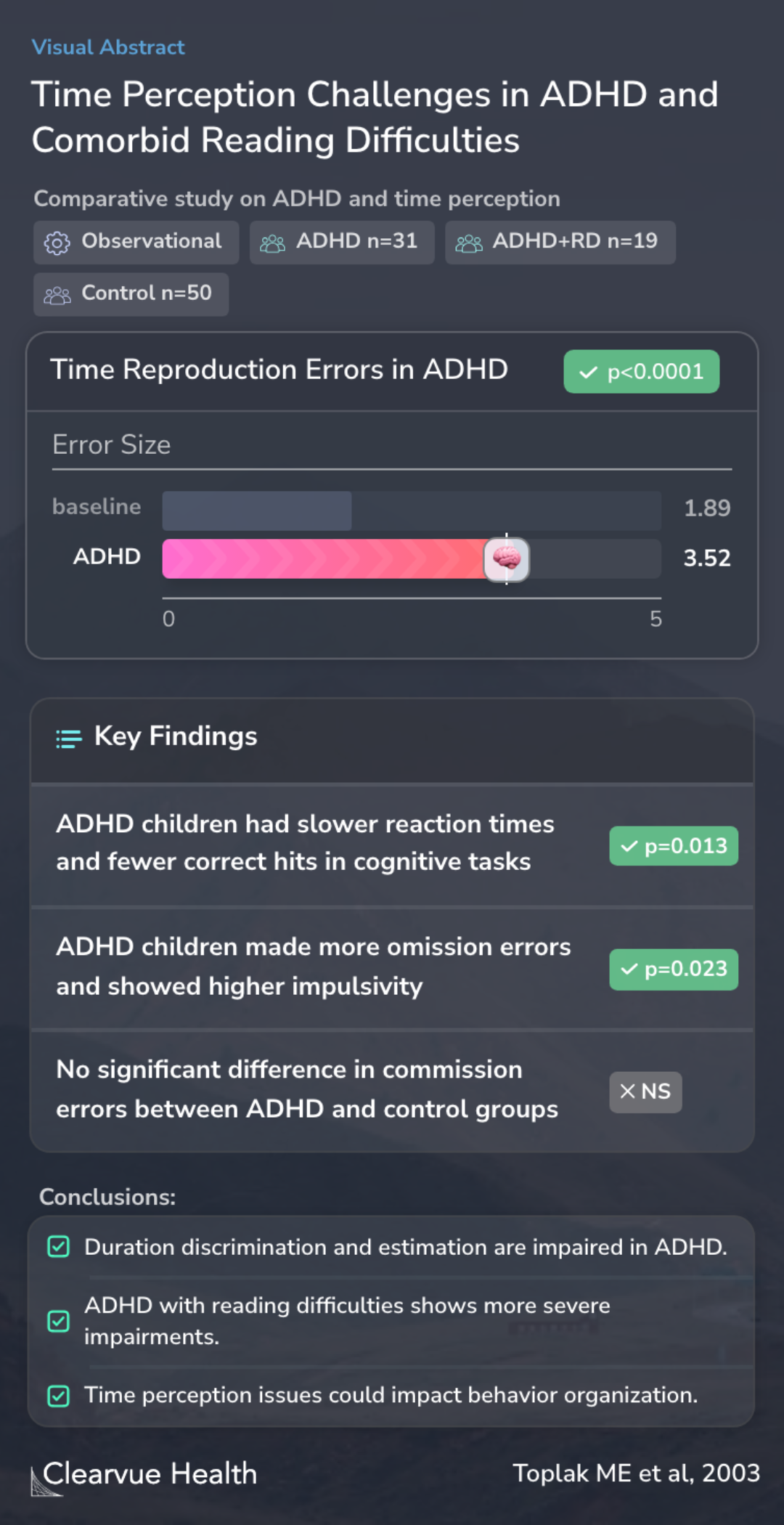Time perception deficits in attention-deficit/ hyperactivity disorder and comorbid reading difficulties in child and adolescent samples
Time Perception Challenges in ADHD and Comorbid Reading Difficulties
Toplak ME, Rucklidge JJ, Hetherington R, John SC, Tannock R

Objectives
The study aimed to explore time perception in children and adolescents with Attention-Deficit/Hyperactivity Disorder (ADHD), both with and without comorbid reading difficulties (RD). This investigation was crucial to understanding the nuances of how ADHD affects various cognitive functions, especially in relation to time perception, a less studied area in this context.
Our objective was to investigate time perception in Attention-Deficit/Hyperactivity Disorder (ADHD) with and without comorbid reading difficulties (RD) in child and adolescent participants.
Methods
The research employed two distinct studies. In the first, 50 children with ADHD (31 with ADHD only and 19 with ADHD+RD) were compared against 50 age-matched healthy controls. They completed tasks involving duration discrimination, frequency discrimination, and duration estimation. The second study replicated these tasks with an adolescent sample, including 35 with ADHD, 24 with ADHD+RD, and 39 controls. These tasks were designed to assess their ability to perceive and estimate time intervals, a crucial element in understanding the cognitive functioning in these groups.
In study 1, 50 children with ADHD (31 ADHD, 19 ADHD+RD) and age-matched healthy controls (n = 50) completed three psychophysical tasks: duration discrimination (target duration of 400 ms versus a foil duration), frequency discrimination (a control condition to evaluate general perceptual...
Results
The results revealed that both children and adolescents with ADHD, and particularly those with ADHD+RD, showed marked impairments in duration discrimination and reproducing time intervals, especially the shorter 400 ms interval.
Notably, there were no significant differences found in frequency discrimination tasks. These findings were complemented by a significant level of intra-individual variability in performance on the estimation tasks among ADHD participants. Further analysis indicated that short-term and working memory, estimated IQ, and teacher reports of hyperactivity/impulsivity were predictive of performance in these time perception measures, especially in the adolescent group. These results underscore the complexity of cognitive challenges faced by individuals with ADHD.
In both studies, children and adolescents with ADHD and ADHD+RD displayed some impairments in duration discrimination and the precision with which they reproduced the intervals on the estimation task, particularly the shorter 400 ms interval. The most severe impairments tended to occur i...
Conclusions
The study's findings highlight significant impairments in time perception tasks among children with ADHD, particularly those with comorbid reading difficulties. This insight is crucial as it not only adds to our understanding of ADHD but also points to the potential cascading effects these deficits might have on the temporal organization of behavior in affected individuals. These conclusions are pivotal in understanding the broader cognitive implications of ADHD and its comorbidities.
Deficits in duration discrimination, duration estimation, and intra-individual performance variability may have cascaded effects on the temporal organisation of behaviour in children and adolescents with ADHD and ADHD+RD.
Key Takeaways
Context
The broader research context around ADHD and time perception suggests a consistent pattern of challenges in time-related cognitive tasks among individuals with ADHD. For instance, a study by Barkley et al., in 1997, revealed that children with ADHD were less accurate in time reproduction, particularly under conditions of distraction, and that medication did not significantly improve this accuracy. This aligns with the current study's findings, reinforcing the notion that ADHD might impair time perception in a way that is not ameliorated by common medications.
Further, studies have consistently shown that individuals with ADHD exhibit slower and more variable reaction times. This has been observed across various studies and tests, suggesting it could be a fundamental aspect of how ADHD affects cognitive processing. The current study fits into this larger body of research by providing more evidence of how ADHD, especially with comorbid conditions like reading difficulties, affects the ability to perceive and process time.